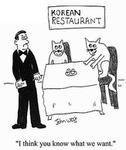| View previous topic :: View next topic |
| Author |
Message |
PastorYoon

Joined: 25 Jun 2010
Location: Sea of Japan
|
 Posted: Tue Apr 19, 2011 6:07 am Post subject: Anyong! = "Good morning, afternoon, night" Posted: Tue Apr 19, 2011 6:07 am Post subject: Anyong! = "Good morning, afternoon, night" |
 |
|
I was teaching my class the other day, and something came up that I thought I would mention. I had an English lesson for kids where I had to use the phrases "good morning", "good afternoon", and "good night". The kids were so young, that they didn't even know what this meant. I know a little Korean, so I said "좋은 아침" (good morning) to the kids, so they could understand what the heck I was talking about. The Korean teacher then blurted out, "안녕!" I figured she didn't understand, so I asked her to translate to the students in Korean what "good morning"meant. Anyway, long story short, she just stuck to the 'anyong' as a universal greeting. She wanted to show me that it could be used in any circumstance. Anyway, because of the point she had to prove to me, the kids didn't learn anything.
Hilarious 
If you have any stories where learning has simply been tossed out the window, tell them. |
|
| Back to top |
|
 |
thegadfly

Joined: 01 Feb 2003
|
 Posted: Tue Apr 19, 2011 7:57 am Post subject: Posted: Tue Apr 19, 2011 7:57 am Post subject: |
 |
|
Did you eat rice, Pastor?
A literal translation is not always helpful, and does not always get the feeling or proper usage across. In English we can say goodbye, whether the other person is leaving our presence, or we are leaving that person's presence...in Korean, there are different phrasings...anyeong hee ke-se-yo or anyeong hee ka-se-yo....
Coca-cola will bring your dead relatives back to life! |
|
| Back to top |
|
 |
WadRUG'naDoo
Joined: 15 Jun 2010
Location: Shanghai
|
 Posted: Tue Apr 19, 2011 10:49 am Post subject: Posted: Tue Apr 19, 2011 10:49 am Post subject: |
 |
|
| If you can't teach that, back to the drawing board... |
|
| Back to top |
|
 |
Hokie21
Joined: 01 Mar 2011
|
 Posted: Tue Apr 19, 2011 11:46 am Post subject: Posted: Tue Apr 19, 2011 11:46 am Post subject: |
 |
|
Anyone here familiar with the TV show "Arrested Development" and the character "Anyong"?
I bought this shirt a few years and and will be moving to Korea next month, if I wore this shirt on the streets would I get lots of dirty looks?
http://www.entertainmentearth.com/prodinfo.asp?number=RJADAS1045+SMALL |
|
| Back to top |
|
 |
Carbon
Joined: 28 Jan 2011
|
 Posted: Tue Apr 19, 2011 2:54 pm Post subject: Posted: Tue Apr 19, 2011 2:54 pm Post subject: |
 |
|
| thegadfly wrote: |
Did you eat rice, Pastor?
A literal translation is not always helpful, and does not always get the feeling or proper usage across. In English we can say goodbye, whether the other person is leaving our presence, or we are leaving that person's presence...in Korean, there are different phrasings...anyeong hee ke-se-yo or anyeong hee ka-se-yo.... |
So the myriad of morning programs on TV and radio are wrong? I mean, I hear 좋은 아침입니다 all the time.
Bottom line: Korean is in trouble. Anything goes these days. How about this gem from the shampoo bottle (and no, it is not in Korean; this is all there is):
데마지 컨트롤 프리미엄 린스
Ridiculous. |
|
| Back to top |
|
 |
PastorYoon

Joined: 25 Jun 2010
Location: Sea of Japan
|
 Posted: Tue Apr 19, 2011 4:23 pm Post subject: Posted: Tue Apr 19, 2011 4:23 pm Post subject: |
 |
|
| Damage control premium rinse? Ha ha. |
|
| Back to top |
|
 |
Sticks
Joined: 13 Mar 2011
Location: Seoul, Korea
|
 Posted: Tue Apr 19, 2011 5:06 pm Post subject: Posted: Tue Apr 19, 2011 5:06 pm Post subject: |
 |
|
I found this little gem on one of the coffee cups from the smaller chain(?)/independent shops
http://img13.imageshack.us/img13/4558/200420111104.jpg
I think my primo growong clevation needs some clond cover. 
Anyway, for good morning I do hear 좋은 아침입니다 or just simply 좋은 아침 occasionally, just use what you feel is comfortable. |
|
| Back to top |
|
 |
jonpurdy
Joined: 08 Jan 2009
Location: Ulsan
|
 Posted: Tue Apr 19, 2011 6:36 pm Post subject: Posted: Tue Apr 19, 2011 6:36 pm Post subject: |
 |
|
| In some of the materials I've used, I put the practical translation first, followed by the literal translation in brackets. Simply explain (or have your co- explain) that the practical and literal translation aren't the same. It should take all of ten seconds. |
|
| Back to top |
|
 |
NYC_Gal 2.0

Joined: 10 Dec 2010
|
 Posted: Tue Apr 19, 2011 7:16 pm Post subject: Posted: Tue Apr 19, 2011 7:16 pm Post subject: |
 |
|
I use this when teaching it to my 3rd graders:
Good morning. - 좋은 아침입니다
Good afternoon. - 좋은 낮입니다
Good evening. - 좋은 저녁입니다
Good night. - 잘 자
Also, just use pictures of the sun waking up, lunch time, evening, and the moon. They'll get it. |
|
| Back to top |
|
 |
lifeinkorea
Joined: 24 Jan 2009
Location: somewhere in China
|
 Posted: Tue Apr 19, 2011 8:14 pm Post subject: Posted: Tue Apr 19, 2011 8:14 pm Post subject: |
 |
|
I don't understand why people are using any Korean. Even "Anyeong" is too much.
You need to make routine/daily activity lessons. At least 1 for morning, 1 for afternoon, and 1 for evening. Get pictures of activities for each part of the day. For 4th and 5th graders, you can just do meals of the day if you want more time to do other stuff.
Use phrases with actions "Good morning, let's eat breakfast", "Good afternoon, let's play soccer". Some books use the sun rising and moon (owl sleeping) to show the time of day. |
|
| Back to top |
|
 |
edwardcatflap
Joined: 22 Mar 2009
|
 Posted: Tue Apr 19, 2011 8:33 pm Post subject: Posted: Tue Apr 19, 2011 8:33 pm Post subject: |
 |
|
| Quote: |
I don't understand why people are using any Korean. Even "Anyeong" is too much.
|
Good point, what's wrong with pictures of clocks, pictures of the sun rising, setting, moon etc... It's like teaching in Italy and translating 'hello' and ' goodbye' into 'ciao' and 'ciao' |
|
| Back to top |
|
 |
NYC_Gal 2.0

Joined: 10 Dec 2010
|
 Posted: Tue Apr 19, 2011 8:36 pm Post subject: Posted: Tue Apr 19, 2011 8:36 pm Post subject: |
 |
|
| lifeinkorea wrote: |
| I don't understand why people are using any Korean. Even "Anyeong" is too much. |
So when you give vocabulary tests, you ask them to draw a picture? |
|
| Back to top |
|
 |
edwardcatflap
Joined: 22 Mar 2009
|
 Posted: Tue Apr 19, 2011 9:16 pm Post subject: Posted: Tue Apr 19, 2011 9:16 pm Post subject: |
 |
|
| Give them pictures, or make a gap fill |
|
| Back to top |
|
 |
NYC_Gal 2.0

Joined: 10 Dec 2010
|
 Posted: Tue Apr 19, 2011 9:42 pm Post subject: Posted: Tue Apr 19, 2011 9:42 pm Post subject: |
 |
|
| I use pictures, but if I don't give a translation once, they're going to think that "good morning" means morning. Little kids need a bit of translation. |
|
| Back to top |
|
 |
zappadelta

Joined: 31 Aug 2004
|
 Posted: Tue Apr 19, 2011 9:53 pm Post subject: Posted: Tue Apr 19, 2011 9:53 pm Post subject: |
 |
|
| NYC_Gal 2.0 wrote: |
I use this when teaching it to my 3rd graders:
Good morning. - 좋은 아침입니다
Good afternoon. - 좋은 낮입니다
Good evening. - 좋은 저녁입니다
Good night. - 잘 자
Also, just use pictures of the sun waking up, lunch time, evening, and the moon. They'll get it. |
These expressions are ridiculous. |
|
| Back to top |
|
 |
|

